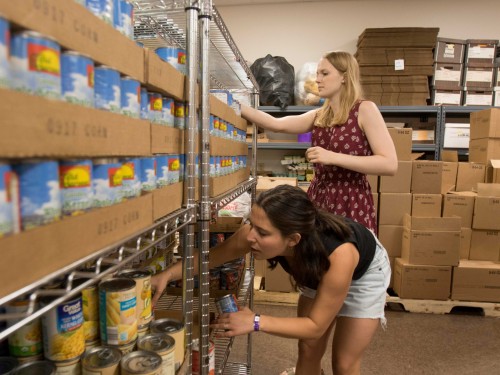“In a humanities class, you should be learning about society and people. Why not experience society and people for yourself while you’re learning about it?” said Olivia DeSilva ’17, a religious studies major who was one of 10 students in the course “Prophecy” taught by Professor of Religious Studies Miriam Dean-Otting ’74 P’05,06.
The class called for students to explore social issues by volunteering in Knox County. This idea naturally connected to Dean-Otting’s course about prophetic voices in the Bible, such as Isaiah, Jeremiah and Ezekiel, who brought light to social injustices.
“The Hebrew prophets are really the social critics of antiquity,” Dean-Otting said. “They are calling out for justice in society. However, what they are addressing is very much like what modern voices discuss: inequities in public education, food insecurity, poverty and environmental disasters.”
The Our Path Forward comprehensive campaign seeks to boost support for experiential learning like Dean-Otting's course, enabling students to apply skills they hone in the classroom to real world problems. These sorts of hands-on learning experiences set up students for success after graduation.
Dean-Otting had students focus on a topic close to home: food insecurity. The topic was a natural fit because of the number of families in Knox County that lack reliable access to affordable, nutritious food and the nearby food banks that need volunteers, she said.
Students were required to volunteer at least two hours a week at the Salvation Army or Interchurch Social Services in nearby Mount Vernon. Students stocked food pantries and assisted families in selecting groceries. At Interchurch, volunteers also organized clothes in a thrift shop. Their experiences helped students realize the complexities of the social injustices they were discussing in class.
Elizabeth Abrash ’17 said, “Talking about [food insecurity] in a classroom is not at all the same as talking to people who are food insecure. It was one thing to be like, ‘They just need access to vegetables,’ and another thing to be like, “Well, there are vegetables here, but what are you going to do with one tomato and some peppers?’”
The class affected not only her notion of community but her scientific work as well. Working as a researcher at the Cleveland Clinic after graduation, Abrash considered studying how nutrition can affect gene expression in people.
“It was really nice to do the Prophecy class as a science major,” Abrash said. “I don’t leave the cell ever. I actually very rarely leave the nucleus of the cell. … It’s nice to remember that there are humans, and they are made up of cells and you should talk about them, too.”
